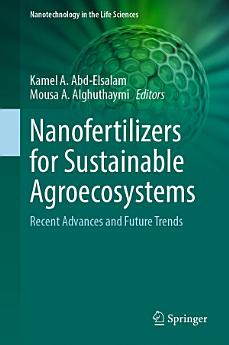Nanofertilizers for Sustainable Agroecosystems: Recent Advances and Future Trends
关于此电子书
Nanofertilizers should also attain increased efficiency because of a several-fold increase in the surface-to-volume ratio of nano-forms of nutrients and their suitability for foliar application, where environmental losses are further reduced. Nanostructured fertilizers can also improve nutrient useefficiency through strategies such as targeted distribution and progressive or controlled-release as they can precisely release their active molecules in response to environmental cues and biological demands. Recent research shows nanofertilizers can increase agricultural productivity by speeding up seed germination, seedling growth, photosynthetic activity, nitrogen metabolism, and carbohydrate and protein synthesis.
The potential agricultural benefits of nanofertilizers, their modes of action, and the fate of nanomaterials in soil are all discussed in this book. It also covers nanofertilizer formulation and delivery, applications, uptake, translocation, and their fate in plants, as well as their impact on plant physiology and metabolism. Nutrient nanoformulation is a valuable method that has the potential to alter the agricultural sector and provide solutions to current and future concerns for sustainable and climate-sensitive crops作者简介
Kamel A. Abd-Elsalam, Ph.D. is currently a Research Professor at the Plant Pathology Research Institute, Agricultural Research Center, Giza, Egypt. Dr. Kamel’s research interests include developing, improving, and deploying plant biosecurity diagnostic tools, understanding, and exploiting fungal pathogen genomes, and developing eco-friendly hybrid nanomaterials for controlling toxicogenic fungi, plant diseases and Agroecosystems applications. He published 23 books related to nano-biotechnology applications in agriculture and plant protection were published by the world’s major publishing houses (Springer, Tylor Frances, and Elsevier). Since 2019, he has served as the Editor-in-Chief of the Elsevier book series, Nanobiotechnology for Plant Protection, he also serves as the Series Editor of the Elsevier book series Applications of Genome Modified Plants and Microbes in Food and Agriculture. He has also participated as an active member of the Elsevier Advisory Panel, giving feedback and suggestions for improvement of Elsevier’s products and services since 2020. Published more than 232 scientific research in international and regional specialized scientific journals with a high impact factor, and has an h-index of 40, i-10 index of120 with 6312+ citations. Also, he served as a Guest Editor for the Journal of Fungi, Plants, and Microorganisms, and as a Review, Editor for Frontiers in Genomic Assay Technology and referred for several reputed journals. He was ranked in Top 2% most influential scientist in the world in nanobiotechnology for the 2020 and 2021 by Stanford University, In 2014, he was awarded the Federation of Arab Scientific Study Councils Prize for excellent scientific research in biotechnology (fungal genomics) (first ranking). Kamel earned his Ph.D. in Molecular Plant Pathology from Christian Alberchts University of Kiel (Germany) and Suez Canal University (Egypt), and in 2008, he was awarded a postdoctoral fellowship from the same institution. Dr. Kamel was a visiting associate professor at Mae Fah Luang University in Thailand, the Institute of Microbiology at TUM in Germany, the Laboratory of Phytopathology at Wageningen University in the Netherlands, and the Plant Protection Department at Sassari University in Italy.
Mousa A. Alghuthaymi is currently a professor, he obtained a Ph.D. in Microbiology from King Saud University in 2013. Dr. Mousa research interests include the development, improvement, and deployment of plant biosecurity diagnostic tools, the understanding and exploitation of fungal pathogen genomes, and the development of eco-friendly hybrid nanomaterials for the control of toxicogenic fungi, plant diseases, and Agroecosystems applications. The head of the Biology Department at the College of Science and Human Studies in Shaqra University, Saudi Arabia and a member of the University’s Scientific Council since March 2022, and previously worked as the Head of the Chemistry Department between 2016-2018, and He published 14 chapters in 12 books and published about 40 research papers in refereed scientific journals.





